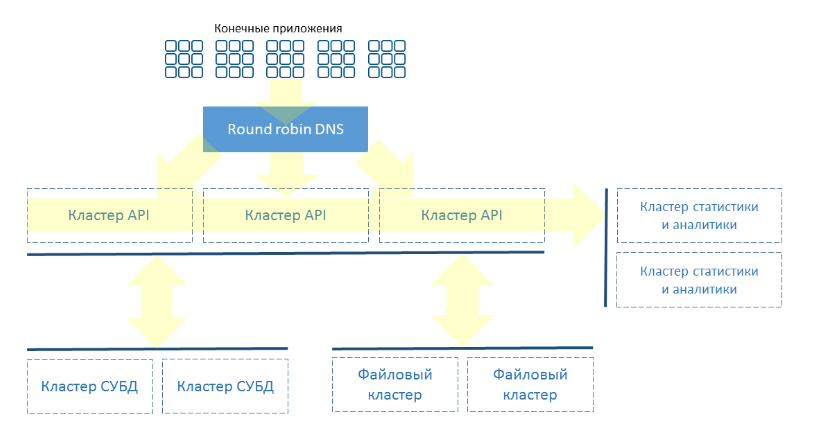“A bit about platforms”: Backend-as-a-Service
Five years ago, the backend-as-a-service (BaaS) market was quite small. Today it is estimated at 1.32 billion dollars and it is expected that this figure will rise to 28 billion by 2020. In this article we will see why BaaS is needed and consider the principles of how a BaaS provider works with a specific example.

/ photo CommScope CC
Today, using BaaS, developers are able to quickly build the necessary backend and platform for processing data from mobile applications. BaaS features include cloud storage, push notifications, user and file management, location services, and more. All of these services have their own API, which allows them to easily integrate into applications.
In essence, BaaS solves three tasks for developers. The first is the speed of development. For each project, it is necessary to define a key set of product features and technologies used, with which the project will be implemented. Backend-as-a-Service solves these problems by answering the question: “How to get to the next iteration quickly, cheaply and with minimal risks.”
')
The second problem that BaaS solves is uniformity. In this case, multiplatform tasks are shifted from the frontend to the backend, which makes it possible to create applications for different operating systems with the same “stuffing under the hood” and not be confused by their features.
The third is coverage. If your startup is built on a specific idea with high virality, BaaS will help with things like integration with social networks and cloud repositories.
BaaS platforms are used by many game developers, social and corporate applications. Earlier, Parse was considered the flagship of the BaaS movement. It was founded in 2011 and provided a solution for remote work with data (processing and storage), which simplified writing server-side business logic in JS.
However, in 2016, Facebook bought a startup and stopped serving customers a year later. This event coincided in time with the development of the domestic BaaS-platform Scorocode from Prof-IT Ventures. The fact that the market needed a new backend solution was reinforced by the results of the analysis. According to statistics , about two thousand mobile applications appear daily in the world: fresh projects are being implemented, new ideas, the number of developers increases by 20–30% every year.
Scorocode is a cloudy backend platform that uses the principle of clustering by type — API, database management systems, files, statistics — and simplifies the development of mobile, desktop, and web applications. Each API cluster that works with end applications can handle up to 25,000 requests per second.

The Scorocode backend platform works as follows: applications access the DNS round robin, which distributes requests across clusters. Further, the cluster API distributes them to the DBMS, providing a many-to-many connection. Note that the main DBMS used in Scorocode is MongoDB, and the company also uses Redis, the RabbitMQ queue server and the high-performance API on Go.
“Google is actively developing the Go language, it is comfortable to write on it, the code is compact, and the performance is kept at C ++ level,” the staff at Prof-IT Ventures say. “Multiple platform microservices are also developed on Go.”
Implementing the Scorocode project, the company wanted to find a reliable hosting provider able to provide fault tolerance to the cloud platform and secure data storage in Russia.
“Since it is difficult to immediately assess the resources required for operation, the solution architecture has been repeatedly adjusted. All this time (about two months) “ IT-GRAD ” allowed us to work for free, quickly allocating the necessary capacities for the project, ” says Ara Israelian, director of software development at Prof-IT Ventures.
For the purposes of Prof-IT Ventures, there was a long-term development of the platform and support for applications throughout their life cycle: this included rapid backend development and prototyping of front-end applications of any scale.
Today, Scorocode provides a ready-made set of functions from the IT-GRAD cloud, which reduces the time to develop applications by facilitating the implementation of routine tasks by the developer, which includes such things as authorization, password recovery, saving and managing user data, modeling, and implementing notifications (push , email, SMS), as well as clear analytics systems.
PS Here are some more materials from our blog:

/ photo CommScope CC
Today, using BaaS, developers are able to quickly build the necessary backend and platform for processing data from mobile applications. BaaS features include cloud storage, push notifications, user and file management, location services, and more. All of these services have their own API, which allows them to easily integrate into applications.
In essence, BaaS solves three tasks for developers. The first is the speed of development. For each project, it is necessary to define a key set of product features and technologies used, with which the project will be implemented. Backend-as-a-Service solves these problems by answering the question: “How to get to the next iteration quickly, cheaply and with minimal risks.”
')
The second problem that BaaS solves is uniformity. In this case, multiplatform tasks are shifted from the frontend to the backend, which makes it possible to create applications for different operating systems with the same “stuffing under the hood” and not be confused by their features.
The third is coverage. If your startup is built on a specific idea with high virality, BaaS will help with things like integration with social networks and cloud repositories.
Real case
BaaS platforms are used by many game developers, social and corporate applications. Earlier, Parse was considered the flagship of the BaaS movement. It was founded in 2011 and provided a solution for remote work with data (processing and storage), which simplified writing server-side business logic in JS.
However, in 2016, Facebook bought a startup and stopped serving customers a year later. This event coincided in time with the development of the domestic BaaS-platform Scorocode from Prof-IT Ventures. The fact that the market needed a new backend solution was reinforced by the results of the analysis. According to statistics , about two thousand mobile applications appear daily in the world: fresh projects are being implemented, new ideas, the number of developers increases by 20–30% every year.
Scorocode is a cloudy backend platform that uses the principle of clustering by type — API, database management systems, files, statistics — and simplifies the development of mobile, desktop, and web applications. Each API cluster that works with end applications can handle up to 25,000 requests per second.

The Scorocode backend platform works as follows: applications access the DNS round robin, which distributes requests across clusters. Further, the cluster API distributes them to the DBMS, providing a many-to-many connection. Note that the main DBMS used in Scorocode is MongoDB, and the company also uses Redis, the RabbitMQ queue server and the high-performance API on Go.
“Google is actively developing the Go language, it is comfortable to write on it, the code is compact, and the performance is kept at C ++ level,” the staff at Prof-IT Ventures say. “Multiple platform microservices are also developed on Go.”
Implementing the Scorocode project, the company wanted to find a reliable hosting provider able to provide fault tolerance to the cloud platform and secure data storage in Russia.
“Since it is difficult to immediately assess the resources required for operation, the solution architecture has been repeatedly adjusted. All this time (about two months) “ IT-GRAD ” allowed us to work for free, quickly allocating the necessary capacities for the project, ” says Ara Israelian, director of software development at Prof-IT Ventures.
For the purposes of Prof-IT Ventures, there was a long-term development of the platform and support for applications throughout their life cycle: this included rapid backend development and prototyping of front-end applications of any scale.
Today, Scorocode provides a ready-made set of functions from the IT-GRAD cloud, which reduces the time to develop applications by facilitating the implementation of routine tasks by the developer, which includes such things as authorization, password recovery, saving and managing user data, modeling, and implementing notifications (push , email, SMS), as well as clear analytics systems.
PS Here are some more materials from our blog:
Source: https://habr.com/ru/post/314592/
All Articles